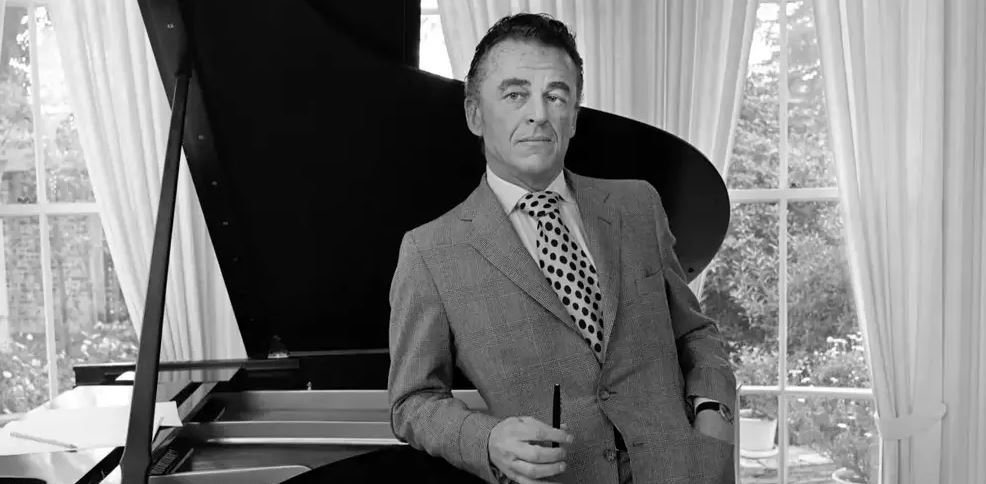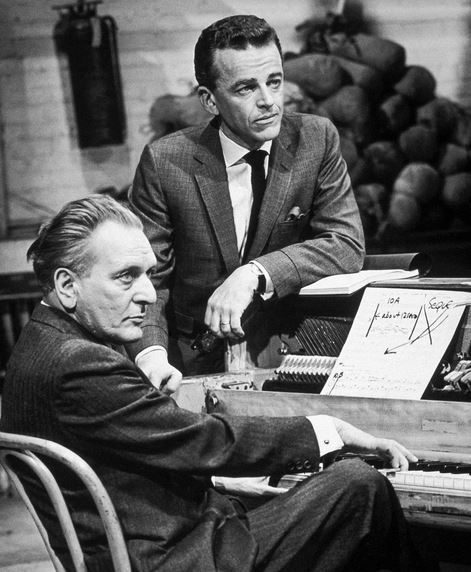Alan Jay Lerner, a name synonymous with Broadway excellence, stands as one of the most influential figures in the world of musical theatre. Best known for his collaborations with composer Frederick Loewe, Lerner’s work in iconic musicals like My Fair Lady, Camelot, and Gigi left an indelible mark on the stage. His unforgettable lyrics and storytelling elevated the musical genre, making him a beloved figure among theatre enthusiasts worldwide. But despite his incredible professional success, Lerner’s later years were marred by personal and health struggles that ultimately led to his death.
The central question surrounding his passing—What caused Alan Jay Lerner’s death?—is tied to a long battle with metastatic lung cancer. Lerner’s health had been in decline for years, and this battle with cancer played a major role in the final chapters of his life. This blog will explore the details of his illness, the impact it had on his life and career, and how it led to his untimely passing on June 14, 1986, at the age of 67.
Alan Jay Lerner’s Illness
Diagnosis and Health Decline
In the years leading up to his death, Alan Jay Lerner was diagnosed with metastatic lung cancer, a serious condition that would ultimately be the cause of his death. Despite the gravity of the diagnosis, Lerner continued to work for some time, even as his health began to deteriorate. He faced this challenge with remarkable strength, but the toll it took on his body was undeniable. His struggle with cancer, along with complications stemming from the disease, began to affect both his personal life and professional commitments. As his condition worsened, his ability to engage with his work significantly decreased, leading him to pull away from various projects, including his much-anticipated contributions to The Phantom of the Opera.
Struggles with Memory Loss
Lerner’s battle with lung cancer was compounded by memory loss, a symptom that further complicated his already challenging health situation. As his cancer advanced, it took a toll on his cognitive function, and he began to experience difficulties with memory and concentration. This impairment affected his ability to continue his creative work, leading to his retirement from active participation in new musical productions. His declining health, particularly the memory loss associated with his illness, made it increasingly difficult for him to engage with the artistic process that had once been his life’s passion.
The Final Stage of His Life
End of Career and Personal Life
In the final years of his life, Alan Jay Lerner’s career began to slow dramatically due to the rapid decline of his health. As his battle with metastatic lung cancer took a toll on his body, Lerner’s involvement in theatre projects became increasingly limited. He had been actively engaged in several major projects throughout his career, but by the mid-1980s, he was unable to participate in many of the exciting ventures that had once been the hallmark of his life’s work. Notably, he had to withdraw from The Phantom of the Opera, a musical that had originally been planned as one of his major projects. His absence from such significant works marked a somber end to his illustrious career.
In addition to his declining health, Lerner faced significant personal challenges. Financial difficulties, which had long been a part of his life, became more pronounced during his final years. Despite his success in the early part of his career, by the 1980s, Lerner found himself struggling with debts and financial mismanagement, which contributed to the stress of his declining health. These personal and financial struggles further compounded the challenges he faced as his professional life came to a halt.
The Impact of His Death
Alan Jay Lerner’s passing on June 14, 1986, left a profound void in the world of musical theatre. His death marked the loss of one of Broadway’s most influential and celebrated lyricists, whose works had touched millions across the globe. Lerner’s musicals, known for their wit, elegance, and heartfelt emotion, continue to be revered in the theatre world today. His death not only ended his career but also signaled the end of an era in Broadway’s golden age.
Even after his passing, his legacy was celebrated in a variety of ways. Tribute performances, retrospectives, and the continued success of his musicals ensured that his influence remained felt. Lerner’s works, particularly My Fair Lady and Camelot, remain staples of the American musical theatre canon. His contributions to the genre continue to be honored in Broadway productions and musical revues, allowing new generations to discover the magic of his songwriting.Through these tributes, Alan Jay Lerner’s impact on the world of musical theatre endures, securing his place as one of the true legends in Broadway history.

Legacy of Alan Jay Lerner
His Contributions to Musical Theatre
Alan Jay Lerner’s contributions to the world of musical theatre have left a lasting legacy that continues to influence Broadway to this day. As a lyricist and librettist, Lerner’s collaboration with composer Frederick Loewe produced some of the most iconic musicals in theatre history, including My Fair Lady, Camelot, Gigi, and Brigadoon. His ability to craft songs that blend poetic lyrics with unforgettable melodies helped define the golden age of American musical theatre.
Lerner’s works continue to be celebrated for their witty, sophisticated lyrics and their emotional depth. My Fair Lady, one of his most famous collaborations with Loewe, remains one of the most performed musicals in the world, with its songs like “I Could Have Danced All Night” and “On the Street Where You Live” still beloved by audiences today. His musicals have been translated into multiple languages and performed around the globe, ensuring that his influence transcends borders and generations.
Tributes After His Death
Even after Alan Jay Lerner’s death, his contributions to musical theatre were honored and celebrated in various ways. Broadway productions continued to perform his classic works, with revivals of My Fair Lady and Camelot reaching new audiences and ensuring that his legacy was preserved for future generations. Additionally, a musical revue dedicated to his life and work, Lerner and Loewe: A Musical Revue, was created to showcase the enduring appeal of his songs.
In the years following his passing, Lerner’s impact was also recognized through retrospectives and tributes, which celebrated his creative genius. Turner Classic Movies (TCM) often aired special features and documentaries about Lerner’s life and works, allowing fans and new audiences alike to explore the depth of his contributions to the world of entertainment.
Conclusion
Alan Jay Lerner’s death marked the end of a remarkable era in musical theatre, but his work continues to resonate through the performances and revivals of his musicals. From My Fair Lady to Camelot, his songs and stories remain an integral part of Broadway’s legacy, cherished by audiences around the world. His struggles in his later years, particularly with illness and personal challenges, do not overshadow the immense impact he had on the theatre community.
As we reflect on his life, it is clear that Alan Jay Lerner’s legacy will forever remain a cornerstone of musical theatre. To learn more about his remarkable career and explore his timeless works, readers are encouraged to visit resources like Wikipedia or Turner Classic Movies, where they can delve deeper into the life and contributions of this Broadway legend.
Frequently Asked Questions (FAQ)
1. What was the cause of Alan Jay Lerner’s death?
Alan Jay Lerner passed away on June 14, 1986, at the age of 67, due to complications related to metastatic lung cancer. His battle with cancer affected his overall health for several years and eventually led to his death. Additionally, his memory loss, a side effect of his illness, caused him to step away from his work, including contributions to The Phantom of the Opera.
2. How did Alan Jay Lerner’s illness impact his career?
Lerner’s decline in health significantly affected his professional life, especially in his later years. His struggle with metastatic lung cancer and its accompanying memory loss forced him to retire from active work on new musicals. He had to withdraw from major projects, such as The Phantom of the Opera, as his health deteriorated. Despite this, his earlier works continue to be celebrated around the world.
3. What is Alan Jay Lerner’s most famous work?
Lerner’s most famous and enduring works include the musicals My Fair Lady, Camelot, Gigi, and Brigadoon. His collaboration with composer Frederick Loewe produced some of Broadway’s most iconic songs, such as “I Could Have Danced All Night” from My Fair Lady and “If Ever I Would Leave You” from Camelot. These songs continue to be staples of musical theatre.
4. How has Alan Jay Lerner been remembered after his death?
Alan Jay Lerner’s contributions to musical theatre have been celebrated posthumously through various tributes and revivals of his works. Broadway has seen several revivals of his musicals, such as My Fair Lady and Camelot, keeping his legacy alive. Additionally, a musical revue, Lerner and Loewe: A Musical Revue, was created to highlight his work with composer Frederick Loewe. TCM (Turner Classic Movies) has also aired retrospectives on his life and works, further honoring his legacy.
5. What impact did Alan Jay Lerner have on musical theatre?
Alan Jay Lerner played a pivotal role in shaping the golden age of American musical theatre. His ability to write sophisticated, emotionally powerful lyrics in collaboration with composer Frederick Loewe produced some of the most beloved musicals of all time. His songs are still cherished by audiences and are regularly performed worldwide, showcasing his lasting impact on both Broadway and the global theatre community.
